大学英语unit7答案
大学英语视听说unit7听力原文+答案
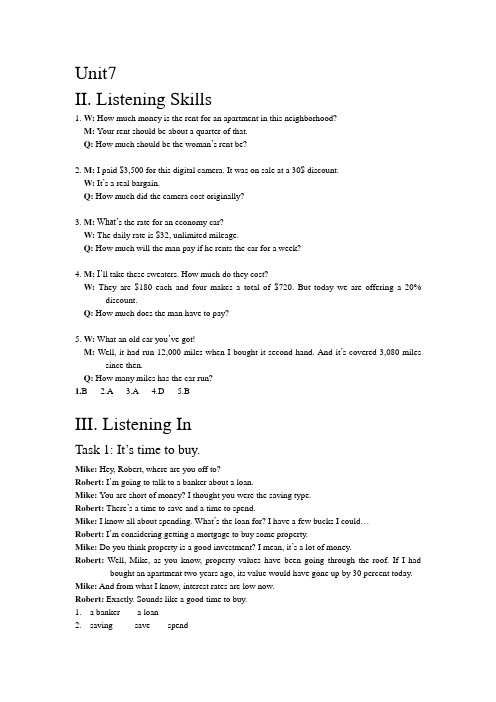
Unit7II. Listening Skills1. W: How much money is the rent for an apartment in this neighborhood?M: Your rent should be about a quarter of that.Q: How much should be the woman’s rent be?2. M: I paid $3,500 for this digital camera. It was on sale at a 30$ discount.W: It’s a real bargain.Q: How much did the camera cost originally?3. M: What’s the rate for an economy car?W: The daily rate is $32, unlimited mileage.Q: How much will the man pay if he rents the car for a week?4. M: I’ll take these sweaters. How much do they cost?W: They are $180 each and four makes a total of $720. But today we are offering a 20% discount.Q: How much does the man have to pay?5. W: What an old car you’ve got!M: Well, it had run 12,000 miles when I bought it second hand. And it’s covered 3,080 miles since then.Q: How many miles has the car run?1.B2.A3.A4.D5.BIII. Listening InTask 1: It’s time to buy.Mike: Hey, Robert, where are you off to?Robert: I’m going to talk to a banker about a loan.Mike: You are short of money? I thought you were the saving type.Robert: There’s a time to save and a time to spend.Mike: I know all about spending. What’s the loan for? I have a few bucks I could…Robert: I’m considering getting a mortgage to buy some property.Mike: Do you think property is a good investment? I mean, it’s a lot of money.Robert:Well, Mike, as you know, property values have been going through the roof. If I had bought an apartment two years ago, its value would have gone up by 30 percent today. Mike: And from what I know, interest rates are low now.Robert: Exactly. Sounds like a good time to buy.1. a banker a loan2.saving save spend3. a mortgage property4.Property values5.risen/gone up/increased by 30 percentTask 2: Can I have my change please?Tom was down on his luck and felt he needed a few drinks. Hw went to a bar and had several drinks. When he was done, he stood up and walked toward the door. The barman shouted after him, “Hey mister, are you going to pay for those drinks?”Tom turned around and replied, “I have already paid you,” and then walked out of the bar. Almost immediately he saw one of his friends Richard and told him about the barman, “Just go in there and drink all you want, then get up and leave. When the barman asks you to pay the bill, just tell him you have already paid.”This sounded easy enough, so Richard went in and has several drinks. The barman went to him and said, “Before you came in, another man was here. When I asked him to pay his bill, he told me he’d paid, but I don’t remember him paying me.”Richard said, “I would love to stay and hear your story, but I don’t have time. Can I havemy change please?”1. A2.B3.D4.C5.CTask 3: Why not just print money?What’s the solution to a recession, a time of little economic activity? Just print money! Sounds reasonable, doesn’t it? Let’s see if this will work by using an example.Let’s pretend that all the students in your class make up the ENTER population of the country, and the teacher represents the government. Let’s also pretend each student has exactly $1.00.Since we are in a recession, let’s have the teacher, who represents the government, print money. He prints $1.00 more for everyone. Now everyone has $1.00 more to spend. More money to spend sounds like a great way to get us out of recession, since more money to spend means demand for goods and services.Then if that works, why don’t we give MORE money away? How about $100? Now we have lots of money to spend. So no more recession, right?Not really, because we have only looked at one side of the problem. As more and more people receive more and more money, what’ll happen?Since everyone has more money, the students all go shopping to spend that extra money. This causes the demand for goods and services to rise, and people who sell goods and services raise price. For example, if you could buy a new music CD at $10 in the past, now the price could be $1,000! This is called inflation.So, the original reason for printing all this money was to help get us of recession, but we have only replaced one problem with another.1.T2.T3.F4.F5.FIV. Speaking OutModel 1 I want to blow it all.John: Hey, Se-Jin, do you want to come shopping with me? My dad just gave me my monthlyallowance and I want to blow it all.Se-Jin:That sounds just like you, John! What do you want to buy?John:I don’t know…Some music CDs, maybe.Se-Jin: If you spend all that money on things you don’t even know if you want, you won’t have any money left when you need it.John:But if I just save my money, that doesn’t s sound like much fun either. Besides, I need some new CDs.Se-Jin: You also need a financial advisor!Model 2 Can money buy everything?Peter: I’m trying to think of ways to become rich. If I could get my hands on a lot of money, I’ll be really happy.Jane: Do you really think so? I’m not so sure.Peter: Of course, why wouldn’t I? I’d be able to have anything I want.Jane: Well, there are plenty of people who have a lot of money but aren’t happy. What do you say to that?Peter: But if I became a millionaire, I’d buy whatever I wanted.Jane: Can you buy true love? Can you buy the moon?Peter: Maybe not, but I can buy a house with a lot of modern conveniences.Jane: So many people think like you do, buy look at all the divorces, suicides and murders among wealthy people. How do you explain that?Peter: Maybe there’s something in what you said.Model 3 I wonder if you could give me a loan.John: Hey, Se-Jin, I was just on my way to find you.Se-Jin: What’s up, John?John:Se-Jin, I’m kind of broke, and you usually have a bundle tucked away. I wonder if you could give me a loan.Se-Jin: Dream on! I’m hard up myself.John:You see, I want to buy some new stereo equipment, and I’m just about a hundred short. Se-Jin: Why not save up for it?John:The stores have all stuff on a huge sales promotion right now. I could save at least 30 percent!S-Jin: John, I’d lend you money if you were in a jam. But a new stereo isn’t an emergency. John: Then I’m afraid I have to find someone who is more easy-going.V. Let’s TalkStory of a MiserThere was a miser who loved money more than anything else. Just before he died, he said to his wife, “Now, listen. When I die, I want you to take all my money and put it in the casket with me. I want to take my money to the afterlife with me.”He made her promise with all her heart that when he dies, she would pit all the money in thecasket with him. Then he died. He was laid in the casket, his wife was sitting there wearing black, and her friend was sitting next to her.When they finished the ceremony, just before the undertakers got already to close the casket, the wife said, “Wait a minute!” She had a box with her. She came over with the box and put it in the casket.Then the undertakers locked the casket down, and they rolled it away. He friend said, “Girl, I know you weren’t fool enough to put all that money in there with your husband!”She said, “Listen, I’m a Christian. I can’t go back on my word. I promise him that I would put all the money in the casket with him.”“You mean you really put that money in the casket with him!?”“I surely did,” said the wife. “I wrote him a check.”1.more than2.money casket3.promise4.in the casket5.sitting black6.next to/beside7.close8. a box9.away/off10.foolish all that money/the money11.a Christian on her word12.put the money13.a checkVI. Furthering Listening and SpeakingTask 1: Giving Money to a BeggarSusan: Hey, Robert, you gave that beggar some of your hard-earned cash?Robert: I know. He looked as if he needed help.Susan: Buy you’re always so careful with your money.Robert: Yeah, I guess so, but I like to help when someone’s in need.Susan: I just wonder why the guy doesn’t get a job and make his own living.Robert: It’s just not that simple, Susan. Some people have a hard time of it in life.Susan: Maybe they waste all their money. If you give them money, they will just go on wasting it. Robert: Life has been good to me, Susan, and I’d like to share some of my luck.1.the beggar2.as if3.help4.careful with/about5. a job6.people7. a hard time8.waste9.share10.good luckTask 2: Buying a MachineAn American manufacturer is showing his machine factory to a potential customer. At noon, when the lunch bell rings, two thousand men and women immediately stop working and leave the building.“Your workers, they’re escaping!” cries the visitor. “You’ve got to stop them.”“Don’t worry, they’ll be back,” says the American. And indeed, an exactly one 0’clock the bell rings again, and all the workers return from their break.When the tour is over, the manufacturer turn s to his guest and says, “Well, now, which of these machines would you like to order?”“Forget the machines,” says the visitor. “How much do you want for that bell?”1.T2.F3.F4.T5.TTask 3: An Introduction to Credit CardsCredit cards are plastic cards issued by a bank or other financial institutions allowing the holder to buy goods and service without using cash. Many American don’t like to carry much cash. For them the cards are convenient and safe to use.Credit cards are gaining popularity, even for buying small items. They are accepted almost everywhere, though not at fast food restaurants.Credit cards allow you to purchase things that you may not currently have the money to buy. When you use a credit card, the credit card company that issued the credit card pays the store. Later, a bill will be mailed to you by your credit card company for the amount you purchased. At that time, you can either pay the bill in full, or only pay a minimum amount, and wait till later to finish paying. If you wait till later, you will owe the credit card company interest on the amount that you do not pay.1.D2.C3.B4.C5.A。
新标准大学英语综合教程(第二版)UNIT 7 B篇练习答案+课文翻译

Text
12 In
August 1944, the hiding place was stormed, and Nazi officers
arrested everyone. They were taken to a transit camp and forced to do hard labour. From there they were taken by train to a concentration camp at Auschwitz. A month later, Anne and Margot were moved to Bergen-Belsen camp in Germany. They both died of typhus and starvation in March 1945. Anne Frank was 15, her sister
4
Text
5
By 1941, the Nazis were arresting large numbers of Jewish people, and sending them to labour camps which quickly became death camps. Otto Frank, Anne’s father, decided to conceal his family, and the family of his business partner. The Franks went into hiding on 6 July 1942, just a few weeks after Anne started her diary, and were joined by the second family, the Van Pels a week later. For the next two years, eight people were confined to just six small rooms and could never go outside. There was rarely enough to eat, and the families lived in a state of poverty.
Unit7大学英语答案讲解
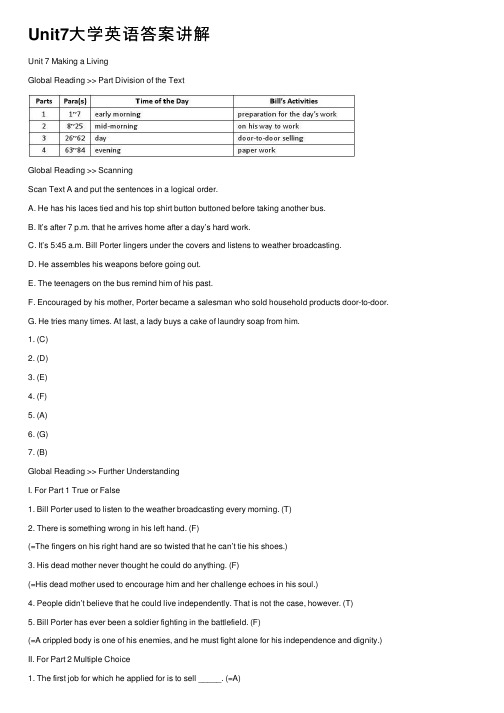
Unit7⼤学英语答案讲解Unit 7 Making a LivingGlobal Reading >> Part Division of the TextGlobal Reading >> ScanningScan Text A and put the sentences in a logical order.A. He has his laces tied and his top shirt button buttoned before taking another bus.B. It’s after 7 p.m. that he arrives home after a day’s hard work.C. It’s 5:45 a.m. Bill Porter lingers under the covers and listens to weather broadcasting.D. He assembles his weapons before going out.E. The teenagers on the bus remind him of his past.F. Encouraged by his mother, Porter became a salesman who sold household products door-to-door.G. He tries many times. At last, a lady buys a cake of laundry soap from him.1. (C)2. (D)3. (E)4. (F)5. (A)6. (G)7. (B)Global Reading >> Further UnderstandingI. For Part 1 True or False1. Bill Porter used to listen to the weather broadcasting every morning. (T)2. There is something wrong in his left hand. (F)(=The fingers on his right hand are so twisted that he can’t tie his shoes.)3. His dead mother never thought he could do anything. (F)(=His dead mother used to encourage him and her challenge echoes in his soul.)4. People didn’t believe that he could live independently. That is not the case, however. (T)5. Bill Porter has ever been a soldier fighting in the battlefield. (F)(=A crippled body is one of his enemies, and he must fight alone for his independence and dignity.) II. For Part 2 Multiple Choice1. The first job for which he applied for is to sell _____. (=A)A. brushesB. household productsC. newspapersD. briefcases2. A representative in Watkins offered him a job to sell household products in a quite ______ section. (=C)A. richB. poorC. remoteD. nearby3. For several years, his sales kept the ______ in Watkins. (=B)A. lastB. highestC. lowestD. secondary4. His first stop on his way to work that day is ______. (=B)A. a bus stopB. a shoeshine standC. a nearby hotelD. a houseIII. For Part 3 Blank FillingSupply the missing information according to the story.It is a windy and rainy day. Bill Porter stopped at the first house. He rings the bell. A woman comes to the door and refuses him by an excuse. The person in the second house even doesn’t give him a chance to speak. For ninety minutes, Porter hasn’t made a sale, but he doesn’t give up. At last a woman is persuaded to buy a cake of soap from him.IV. For Part 4 Group Discussion1. Why did he have to sell his house?2. What is Bill’s home like? What kind of life does he lead?3. Does Bill feel sorry for himself? Why or why not?Detailed ReadingI. Difficult Sentences1.So, too, do the voices of those who believed him stupid, incapable of living independently.1) Translate the sentence into Chinese.[=(在他内⼼深处)也⼀直回响着那些说他蠢,说他不能独⽴⽣活的⼈的声⾳。
新编大学英语综合教程Unit 7课后练习答案
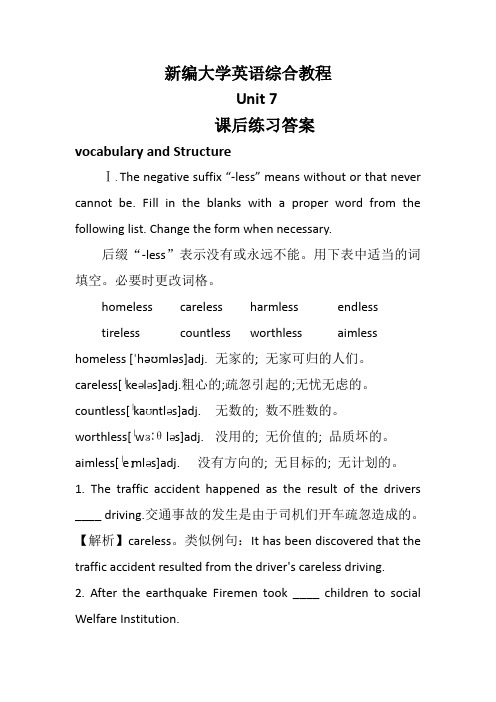
新编大学英语综合教程Unit 7课后练习答案vocabulary and StructureⅠ. The negative suffix “-less” means without or that never cannot be. Fill in the blanks with a proper word from the following list. Change the form when necessary.后缀“-less”表示没有或永远不能。
用下表中适当的词填空。
必要时更改词格。
homeless careless harmless endlesstireless countless worthless aimless homeless [ˈhəʊmləs]adj. 无家的; 无家可归的人们。
careless[ˈkeələs]adj.粗心的;疏忽引起的;无忧无虑的。
countless[ˈkaʊntləs]adj. 无数的; 数不胜数的。
worthless[ˈwɜːθləs]adj. 没用的; 无价值的; 品质坏的。
aimless[ˈeɪmləs]adj. 没有方向的; 无目标的; 无计划的。
1. The traffic accident happened as the result of the drivers ____ driving.交通事故的发生是由于司机们开车疏忽造成的。
【解析】careless。
类似例句:It has been discovered that the traffic accident resulted from the driver's careless driving.2. After the earthquake Firemen took ____ children to social Welfare Institution.【解析】homeless。
unit 7-大学英语综合教程答案
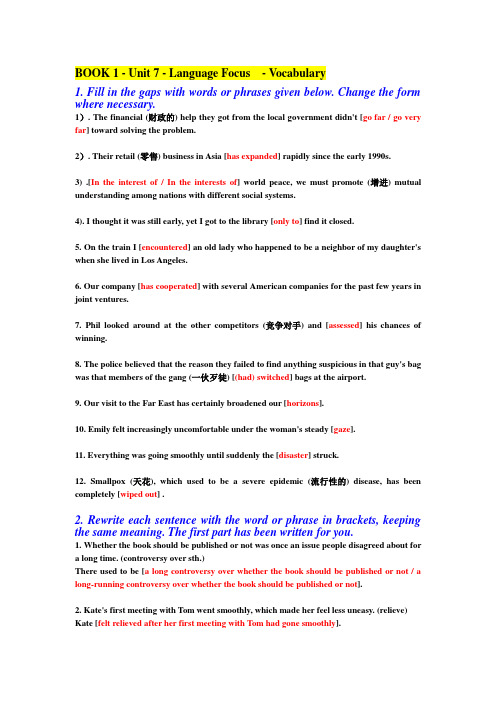
BOOK 1 - Unit 7 - Language Focus - Vocabulary1.Fill in the gaps with words or phrases given below. Change the form where necessary.1). The financial (财政的) help they got from the local government didn't [go far / go very far] toward solving the problem.2). Their retail (零售) business in Asia [has expanded] rapidly since the early 1990s.3) .[In the interest of / In the interests of] world peace, we must promote (增进) mutual understanding among nations with different social systems.4). I thought it was still early, yet I got to the library [only to] find it closed.5. On the train I [encountered] an old lady who happened to be a neighbor of my daughter's when she lived in Los Angeles.6. Our company [has cooperated] with several American companies for the past few years in joint ventures.7. Phil looked around at the other competitors (竞争对手) and [assessed] his chances of winning.8. The police believed that the reason they failed to find anything suspicious in that guy's bag was that members of the gang (一伙歹徒) [(had) switched] bags at the airport.9. Our visit to the Far East has certainly broadened our [horizons].10. Emily felt increasingly uncomfortable under the woman's steady [gaze].11. Everything was going smoothly until suddenly the [disaster] struck.12. Smallpox (天花), which used to be a severe epidemic (流行性的) disease, has been completely [wiped out] .2. Rewrite each sentence with the word or phrase in brackets, keeping the same meaning. The first part has been written for you.1. Whether the book should be published or not was once an issue people disagreed about fora long time. (controversy over sth.)There used to be [a long controversy over whether the book should be published or not / a long-running controversy over whether the book should be published or not].2. Kate's first meeting with Tom went smoothly, which made her feel less uneasy. (relieve) Kate [felt relieved after her first meeting with Tom had gone smoothly].3. I was in the middle of writing the essay when my computer suddenly stopped working properly. (go wrong)Something [suddenly went wrong with my computer when I was in the middle of writing the essay].4. Clearly our company is still maintaining its position as market leader in software. (obvious)It [is obvious that our company is still maintaining its position as market leader in software].5. She insists on a pay rise, otherwise she will stop working for them. (give in)She is determined not to [give in until they give her a pay rise].3. Complete the following, using the words or phrases in brackets. Make additions or changes where necessary.1. Scientists [have undertaken] various kinds of [original] research projects [to explore] animal intelligence, but they still can't reach an agreement on whether it exists or not. (explore, original, undertake)2. Lots of [evidence convinced us] us that the lost ancient tunnel (地道) must have run right [underneath] the city, [extending to] the seashore. (extend, convince, evidence, underneath)3.We should try [to negotiate] a win-win solution when resolving issues we [encounter] in foreign trade. First we need [to figure out] what caused the problems. Then we should proceed to [explore] ways of solving them that are beneficial to both sides. (encounter, figure out, explore, negotiate)BOOK 1 - Unit 7 - Language Focus - Confusable WordsFill in the gaps with at first or first or firstly according to the context. 1. Phil studies management science [firstly] because he enjoys it and secondly because he wants to get a good job.2. Tickets can be bought here on a [first] come, [first] served basis.3. [At first] I thought the house was empty, then I heard a woman's voice come from the kitchen.4. [Firstly / First] I have to send the email to John, then I'll come shopping with you.5.When people get their newspaper, which page do they read [first]?BOOK 1 - Unit 7 - Language Focus - UsageFind eight similar phrases from the text and tell how the attributive noun modifies another noun.BOOK 1 - Unit 7 - Language Focus - Comprehensive Exercises1. Complete the following interview with Eugene Linden with words chosen from the Words and Phrases to Drill box. Change the form where necessary.Interviewer: You mention the case of one whale helping to save another in an [emergency](1). What does this suggest?Linden: Well, it seems to me that this is clearly [evidence](2) of [original] (3) thought. Here we see an animal [sizing up](4) a situation and then taking appropriate action in cooperation with humans.Interviewer: And when Jendry [negotiates](5) with Colo, what does that [reveal](6)? Linden: It shows that some animals, gorillas at least, are intelligent enough to bargain, to [make a deal] (7).Interviewer: Then there is the case of Miles and Chantek.Linden: Oh, yes. We like to think of ourselves as the [dominant](8) species, but that doesn't mean animals can't sometimes play tricks on us when it's [in their interest / in their interests](9).Interviewer: Like Melati [deceiving](10) Shewman?Linden: Exactly.Interviewer: So would you say your approach to the problem settles the [controversy](11) over animal intelligence?Linden: That's not an easy [judgment](12) to make, but it does, I think, open up interesting new paths to [explore](13).2. Read the following passage carefully until you have got its main idea, and then select one appropriate word for each gap from the box following the passage.Behavior is the way that animals act. For example, how do they get food or take care of their young? How do they find a place to live in or [protect] (1) themselves from danger? Much behavior is innate; that is, animals are born with it. [However] (2), animals learn much other behavior. There are several kinds of learned behavior.One simple [type] (3) of learned behavior is habituation. This happens when an animal learns to feel comfortable in a new [situation] (4) and doesn't pay attention to it anymore. For example, young horses are often afraid of noisy streets. But after a while, they learn to pay no attention to the normal [sights] (5) and sounds of a city.Another kind of learned behavior is conditioning. It is a way of learning by association —that is, by putting [together] (6) different ideas. In 1900, Ivan Pavlov, a Russian biologist, studied conditioning in dogs. Dogs innately salivate (produce liquid in the mouth) when they smell food. Pavlov [rang] (7) a bell every time he gave food to a dog. Soon the dog started to [associate] (8) the sound of the bell with the smell of food. After some time, it salivated when it heard a bell alone, [without] (9) food.Learning is important for all animals in a new [environment] (10). It allows an animal to be adaptable —that is, able to change in a new situation.3. Translate the following sentences into English, using the words or phrases in brackets.1. 当地一家公司承担了此项工程,但工程没完成就破产了。
新标准大学英语综合教程(第二版)UNIT 7 A篇练习答案+课文翻译

Text
5 “Yes, yes, of course,” murmured the company, more and more agitated.
6 “Seldom has a city gained such world renown, and I am proud and happy to welcome you to Hiroshima, a town known throughout the world for its – oysters.”
Warming Up
HARRY TRUMAN: “The world will note that the first atomic bomb was dropped on Hiroshima, a military base. We won the race of discovery against the Germans. We have used it in order to shorten the agony of war, in order to save the lives of thousands and thousands of young Americans. We shall continue to use it until we completely destroy Japan’s power to make war.” American planes dropped one of the bombs on Hiroshima on August 6, 1945, and another on Nagasaki 3 days later. Exactly how many people in those 2 cities died from the force and heat of the blasts or later from radiation may never be known. The Radiation Effects Research Foundation in Japan estimates that between 150,000 and 246,000 died within 2 to 4 months of the bombings. Japan surrendered on August 15, 1945, 6 days after the Nagasaki bombing.
新视野大学英语(第三版)读写教程第三册Unit7课后练习答案
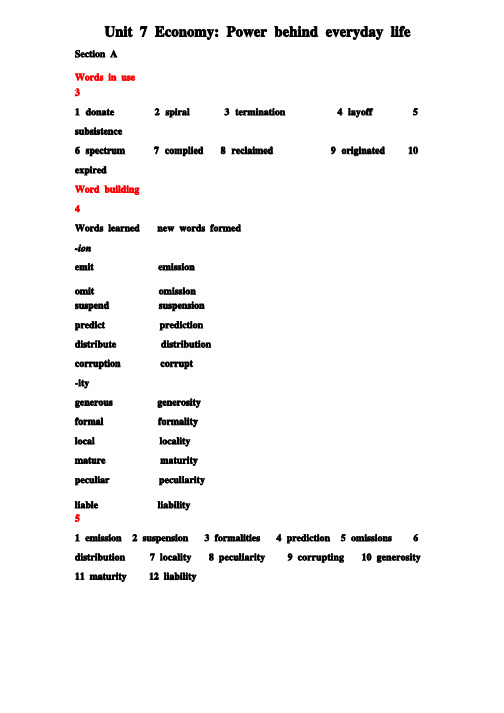
Unit 7 Economy: Power behind everyday life Section AWords in use31 donate2 spiral3 termination4 layoff5 subsistence6 spectrum7 complied8 reclaimed9 originated 10 expiredWord building4Words learned new words formed-ionemit emissionomit omissionsuspend suspensionpredict predictiondistribute distributioncorruption corrupt-itygenerous generosityformal formalitylocal localitymature maturitypeculiar peculiarityliable liability51 emission2 suspension3 formalities4 prediction5 omissions6 distribution7 locality8 peculiarity9 corrupting 10 generosity 11 maturity 12 liabilityBanked cloze61 E2 J3 B4 H5 A6 K7 G8 I9 C 10 NExpressions in use71 put down2 wind up3 scrape together4 on the verge of5 in all likelihood6 deteriorate into7 are in a position8 gave way to Translation9世界贸易组织成立于1995年1月1日,旨在监督和促进国际贸易自由化。
该组织负责对成员国之间的贸易进行调控,为贸易协定的谈判和形成制定框架,并提供争端解决机制以敦促成员国遵守世贸协定,而这些协定皆为各成员国政府的代表所签署并获得其立法机构的批准。
新标准大学英语综合教程4 unit7答案

Unit 7 No place like home
Teaching suggestions and answer keys
Starting point
Teaching tips Go round the class with each student saying a two or three sentences about his / her first home.
Speaking skills
• Expressing associations • Exploiting a word to the full [home] • Gathering opinions and expressing
results as generalizations
the
• Ask Ss to report on their pair work to ensure they understand the tasks properly.
4 Choose the best answer to the questions. 1 Why does the narrator never see his neighbour face on? (a) Because he can’t really see. (b) Because the neighbour is a long way away. (c) Because the narrator and the neighbour are joined in a line. (d) Because the morning sun shines on the narrator instead of the neighbour.
home
- 1、下载文档前请自行甄别文档内容的完整性,平台不提供额外的编辑、内容补充、找答案等附加服务。
- 2、"仅部分预览"的文档,不可在线预览部分如存在完整性等问题,可反馈申请退款(可完整预览的文档不适用该条件!)。
- 3、如文档侵犯您的权益,请联系客服反馈,我们会尽快为您处理(人工客服工作时间:9:00-18:30)。
大学英语unit7答案【篇一:大学英语精读book1 unit7答案】book1 unit7答案1)e2)f3)g4)c5)j6)a7)b8)i9)d10)h1) dignity2) eventually3) intentions4) in a row5) pulled out6) selected7) to your taste8) elderly9) privileges10) sampled11) cheating12) take advantage of13) worn14) suspected15)and whats more1) was positive that she was able to do the job although his co-owner considered her to be inadequate for it.2) it was evident that it would soon rain.3) long for a chance to return to their homeland for a visit.4) the salesman really took advantage of her ignorance.5) mistake her for her mother on the phone.6) going to a disco occasionally, but not so often that it becomes a bore.1) useless3) colorful4) jobless5) hopeful6) endless7) pitiful8) powerful1) sampler2) beginner3) liar4) shoppers5) beggars6) actor7) sailors8) translators1) evidence2) evidently4) evident1) kind2) kindly3) kindness4) kindly1) eagerly2) eager3) eagerness4) eager1) sincere2) sincerely3) sincerity4) sincere1) occasional2) occasionally3) occasion4) occasionally1) allowed/ permitted2) allowed/ permitted3) were allowed4) allow/ permit5) allow/ let6) let1) he talks/talked about florida as if he had been there.2) he looks/looked as if he had never had a decent meal.3) she talks as if she knew where they are.4) he behaves as if he owned the place.5) he orders me about as if he were my boss.1) he looks as if he is putting on weight.2) it feels as if it is made of cotton.【篇二:全新版大学英语综合教程第二版第三册课后习题答案-第七单元】class=txt>text a life of a salesmanpart ii text acontent questions 1.a surgeon’s scar cuts across his lower back. the fingers on his right hand are sotwisted that he can’t tie his shoes. his mother’s challengesand the voices of thosewho believed him stupid, incapable of living independently keep him going on.2. he is a door-to-door salesman. his weapons are: dark slacks, blue shirt andmatching jacket, brown tie, tan raincoat, hat and a briefcase.3. he is afraid that someone will steal his briefcase. he was different in that cerebralpalsy affected his speech, hands and walk.4. first a school for the disabled and then lincoln high school, where he was placedin a class for slow kids.5. she was certain that he could rise above his limitations.6.he applied for a salesman’s job.7. with his mother setting up a meeting with a watkins representative, as well as byhis own persistence.8. he lacked confidence. it took him quite a while to have the courage to ring the firstdoorbell.9. he keeps coming back until the customer buys. he tells himself not to worry if hidday has not turned out to be profitable.10.because he was laid up for five months after band surgery and couldn’t work.11.like a home of the past era. he leads a solitary life.12.no, he doesn’t. because he liv es a life of dignity.text organization 1.2.1vocabulary:1) disabled2) impatient 3) solitary 4) crushed5) feel like 6) lashed 7) echoing 8) paused9) betrayed 10) laundry 11) section 12) tilted2.1) cared for 2) hang on3) was laid up with 4) are gaining on5) kicked up 6) went off7) drop ... off 8)straighten out3.1) … sometimes didnt register with her.2) … in disorder, drawers pulled out, shoes and boots scattered.3) … was transferred from fathers account to my account.4) … a pledge to contribute 1000,000dollars to the children in needed charity.5) … the most profitable business in that province.4. 1) gaining on;off balance; was laid up in;scar on2) a cripple\ crippled ; surgery ,limitations, in literature.3) commission ; on the phone ; his territory ; never registers withii. usage1. i never did go over these books, although i probably should have.2. i know this is a personal question. you dont have to answer me if you dont wantto.3. i think this topic should have attracted far more attention from philosophers than ithas.4. i think youre right. — im sure i am.5. he thought that the condition was hereditary in his case. —well, it might be.6. sugar? ---- no. maybe next time.7. the house is only a building. it is a place to live, nothing more.8. diane: you didnt! tell me you didnt!father: oh, yes. anything for my children.iii. word family1.1) bored 2) boredom3) bored 4) boringly5) boring2.1) encouraged 2) encouragingly3) encouraging 4) encouragement23.1) frozen3) freezing5) freeze 2) freeze 4) freezercomprehensive exercisesi cloze1. text-related1) off … feet 2) signature 3) commission4) on the phone5) laid up 6) surgery7) territory8) disorder9) applying for 10) dignity2. theme-related1)didn’t 2) read 3) come4) money5) because 6) earning 7) doing 8) own9)obviously10) valueii. translationi. i grew terribly scared when i heard sound of footsteps echoing round the hallway atmidnight yesterday.2. the name-brand sports shoes are guaranteed for 12months.3. snowstorms threw communications and transportation into disorder.4. i’ve been suffering a lot of stress from work lately, i feel like taking a vacation atthe seaside.5. living in an apartment is all right, but it has its limitations--- for example, you don’thave your own gardens.6. tom was born a cripple, with one of his lower limbs useless. early in his childhood,he learned that unless he so exerted himself as to rise above his limitations, he could not earn a living, and unless he succeeded in making a living on his own, he could notwin/gain the respect of others. that was the price he had to pay for his dignity as a human being.tom applied for numerous jobs, only to be turned down, before he finally got one as adelivery boy for a pizza hut. he then worked as a sales representative for a sportswear company in a territory no one else would want. today he owns a fairly profitable retail shop in his hometown, and hires several people to work for him.part iii textbcomprehension check1. c3. a5. d 2. d 4. d6. b3translation1. 当时我俩并未意识到这一点,但那就是我们之间开始拉开距离的日子,是开始在家庭内部重新界定劳动者的意义的日子。
